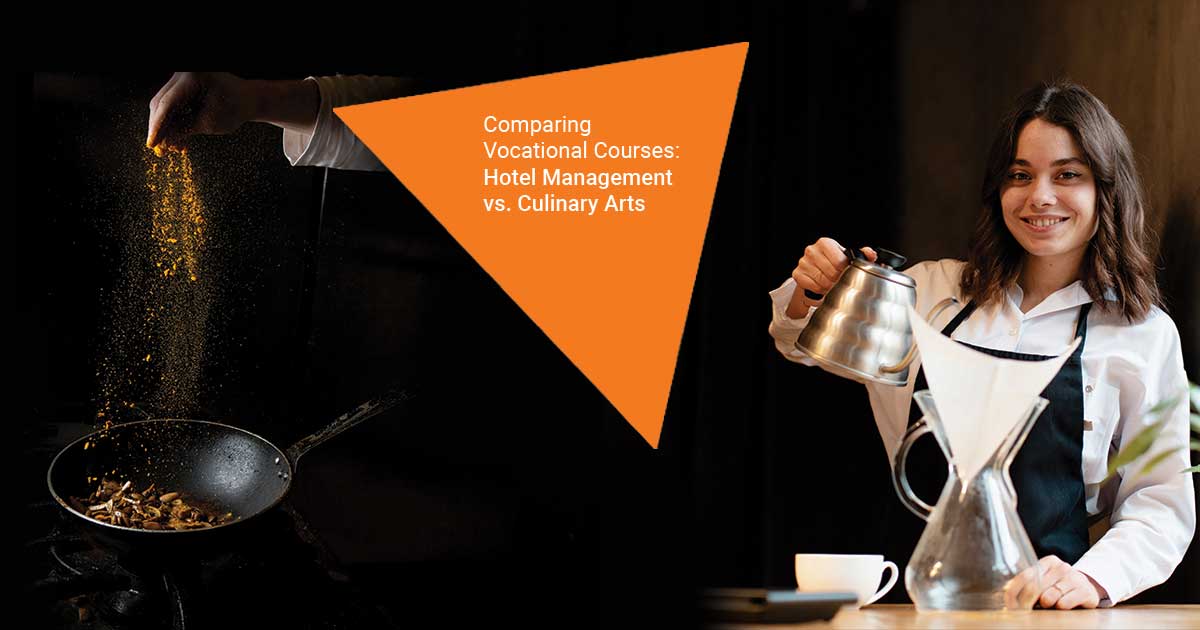Blog Detail


Comparing Vocational Courses: Hotel Management vs. Culinary Arts
11-12-2023

The growth of international and domestic tourism continues to fuel demand for hospitality services around the world. The emergence of high-class and budget-friendly hotels, resorts, and online booking platforms has further propelled the demand for experts in hotel management and culinary arts. The emphasis on guest satisfaction and personalised experiences has increased the demand for hospitality professionals who can ensure exceptional customer service. Obtaining a formal education in hospitality serves as a fundamental step for individuals aspiring to embark on careers in the restaurant or hotel industry. Among the array of courses offered, hotel management and culinary arts courses are two prominent career choices. Although these two fields share some common ground, they possess distinct features. Today, in this blog, we shall explore these two vocational courses and understand the difference between them!
Courses & Duration
In the field of culinary arts, students can enroll in undergraduate (UG) programmes, such as a Bachelor of Arts (B.A) or a Bachelor of Science (B.Sc) in culinary arts. Alternatively, students can opt for shorter-term diploma and certificate courses within the same field. UG degree programmes typically span a duration of three years, while diploma courses can be completed in just one year. For those aiming to advance their culinary education further, pursuing a Master of Arts (M.A) or Master of Science (M.Sc) in culinary arts is a viable option. Both of these postgraduate (PG) programmes encompass a duration of 2 years.
The UG programmes in the hotel management field comprise a Bachelor of Business Administration (BBA) in hotel management and a Bachelor of Hotel Management (BHM). Each of these UG programmes span a three-year timeframe, organised into six semesters. Moreover, students can pursue post-graduation (PG) with the help of a Master of Business Administration (MBA) or a Master of Hotel Management (MHM). The duration of these PG degrees is 2 years, split into 4 semesters. Besides these courses, there is an integrated UG programme in Bachelor of Vocational Studies (B.Voc) in Catering Technology and Hotel Management that combines the elements of both of these disciplines. This specialised course is 3 years long and divided into 6 semesters.
Course Curriculum
Hotel management encompasses the management of all aspects within the hotel industry, focusing on the activities associated with hospitality. The curriculum trains the students to perform tasks such as handling reservations, guest accommodations, housekeeping, inventory management, and other day-to-day operations of a hotel. The core subjects covered in this curriculum are as follows:
- Hospitality Management
- Front Office Management
- Food and beverage management
- Housekeeping Management
- Culinary Arts
- Hospitality Accounting
- Marketing and Sales in Hospitality
- Human Resource Management
- Event Management
- Hotel operations and management
- Tourism and travel management
- Hotel Law and Ethics
The culinary arts primarily revolve around the management of restaurants and food-related establishments. Culinary arts courses focus on developing exceptional food preparation and cooking skills. These specialised programmes often encompass nutrition and sensory evaluation, different types of cuisine preparations, and others. The core topics covered in this curriculum are listed below:
- Culinary Techniques
- Baking and Pastry Arts
- Food Safety and Sanitation
- Menu Planning
- Gastronomy and food culture
- Culinary Nutrition
- Culinary Management
- Wine and Beverage Management
- Farm-to-Table Practices
- Kitchen Operations
Career Opportunities
Hotel management offers a wide career scope in the evolving hospitality and tourism industries. The demand for hotel management professionals is consistently high due to factors like the global growth of tourism, changing consumer preferences, and the constant need for high-quality accommodations. After your graduation, you can work as hotel general managers, responsible for overseeing the entire hotel operations. You can also work as food and beverage managers, overseeing dining services, or front office managers, managing guest services. Sales and marketing managers and revenue managers are also some of the most in-demand career roles these days. Additionally, you can work as housekeeping managers and ensure cleanliness and guest satisfaction.
On the other hand, culinary arts present a vibrant career scope, shaped by the enduring passion for food, culinary tourism, and the global appeal of diverse cuisines. Culinary careers encompass various roles, such as chefs, sous chefs, pastry chefs, and kitchen managers. Additionally, culinary experts with specialisations in dietary restrictions, nutrition, and sustainability are in demand as the culinary landscape evolves to cater to changing dietary preferences. The rise of food media, including cooking shows and food blogging, has amplified the demand for culinary professionals with a creative edge. Culinary education institutions, restaurants, hotels, catering companies, and even healthcare facilities seek skilled culinary talent.
Summing Up
The hospitality industry is a dynamic and expanding field that offers career advancement opportunities in different areas. Among the plethora of courses available, hotel management and culinary arts stand out as potential career pathways. Hotel management prepares students to oversee hotel operations, guest services, and event management. Culinary arts courses, on the other hand, focus on food preparation and cooking skills, catering to the evolving culinary landscape. Both fields offer promising careers, from hotel general managers to chefs and culinary experts, meeting the industry's demand for skilled professionals. Whether in hotel management or culinary arts, the hospitality industry provides a myriad of opportunities for those with a passion for providing exceptional guest experiences and culinary delights.